Abstract
BACKGROUND: Although the study of prognostic factors in small cell lung cancer has reached the stage where they are used to guide treatment, fewer data are available for non-small cell lung cancer. Although correct management decisions in non-small cell lung cancer depend upon a prognostic assessment by the supervising doctor, there has never been any measurement of the accuracy of physicians' assessments. METHODS: A group of consecutive patients with non-small cell lung cancer was studied and the predictions of their physicians as to how long they would survive (in months) was compared with their actual survival. A prognostic index was also developed using features recorded at the patients' initial presentation. RESULTS: Two hundred and seven consecutive patients diagnosed and managed as non-small cell lung cancer, who did not receive curative treatment for their condition, were studied. Of the 196 patients whose date of death was known, physicians correctly predicted, to within one month, the survival of only 19 patients (10%). However, almost 59% of patients (115/196) had their survival predicted to within three months and 71% (139/196) to within four months of their actual survival. Using Cox's regression model, the sex of the patient, the activity score, the presence of malaise, hoarseness and distant metastases at presentation, and lymphocyte count, serum albumin, sodium and alkaline phosphatase levels were all identified as useful prognostic factors. Three groups of patients, distinct in terms of their survival, were identified by the use of these items. When the prediction of survival made by the physician was included as a prognostic factor in the original model, it was shown to differentiate further between the group with a poor prognosis and the other two groups in terms of survival. CONCLUSIONS: Physicians were highly specific in identifying patients who would live less than three months. However, they had a tendency to overestimate survival in these patients, failing to identify almost half the patients who actually died within this time. Both the physicians and the prognostic factor model gave similar performances in that they were more successful in identifying patients who had a short time to survive than those who had a moderate or good prognosis. Physicians appear to use information not identified in the prognostic factor analysis to reach their conclusions.
Full text
PDF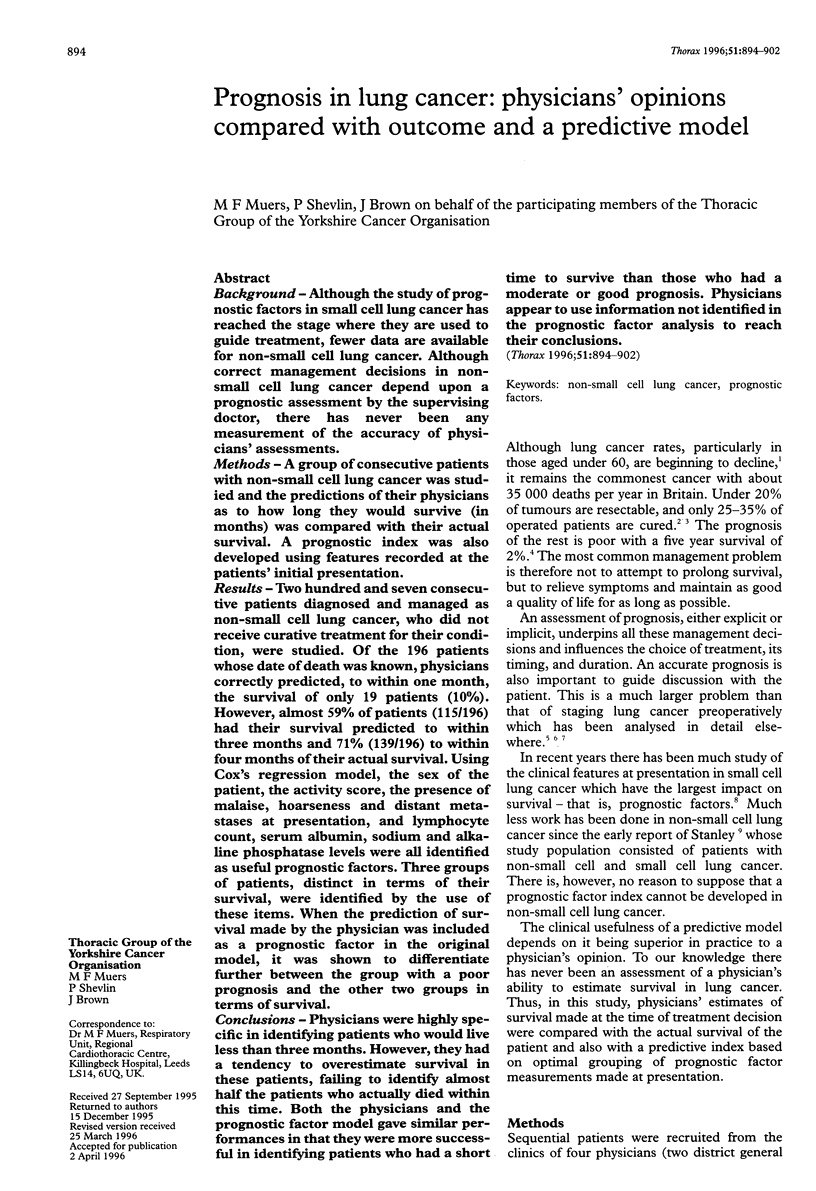
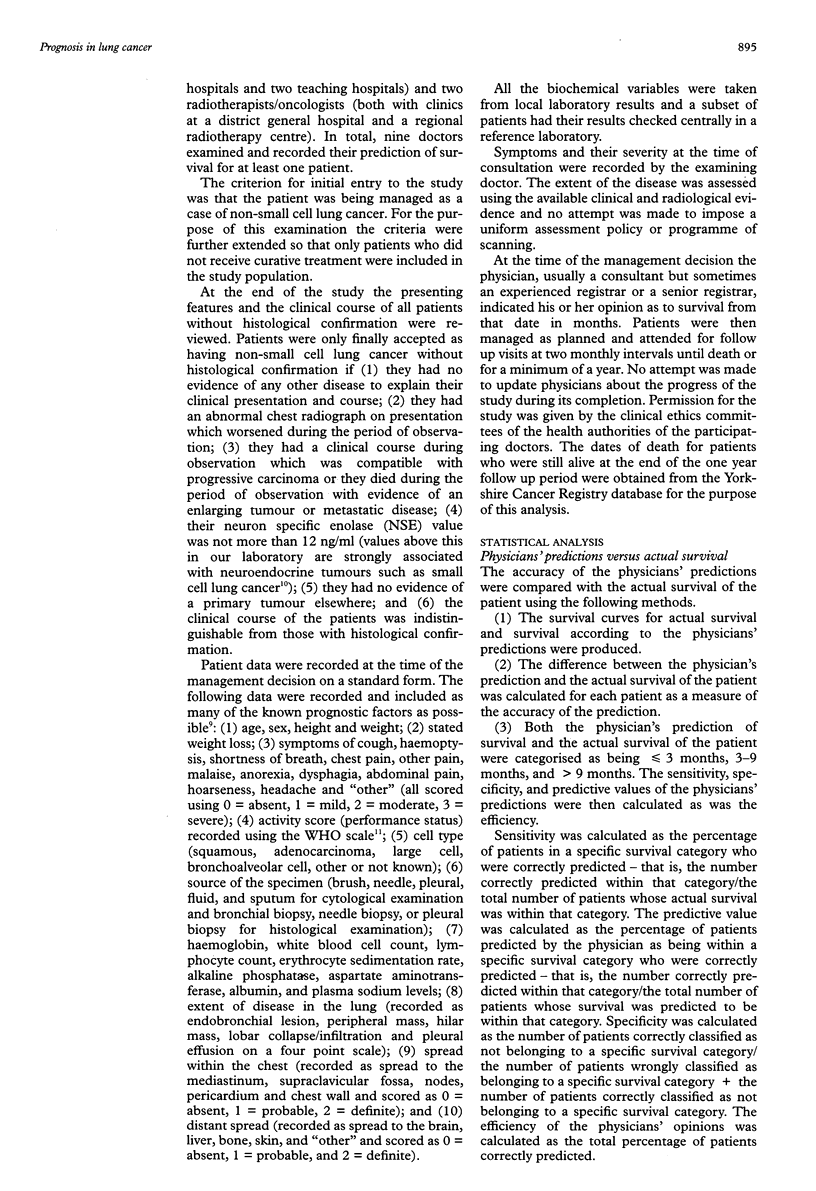
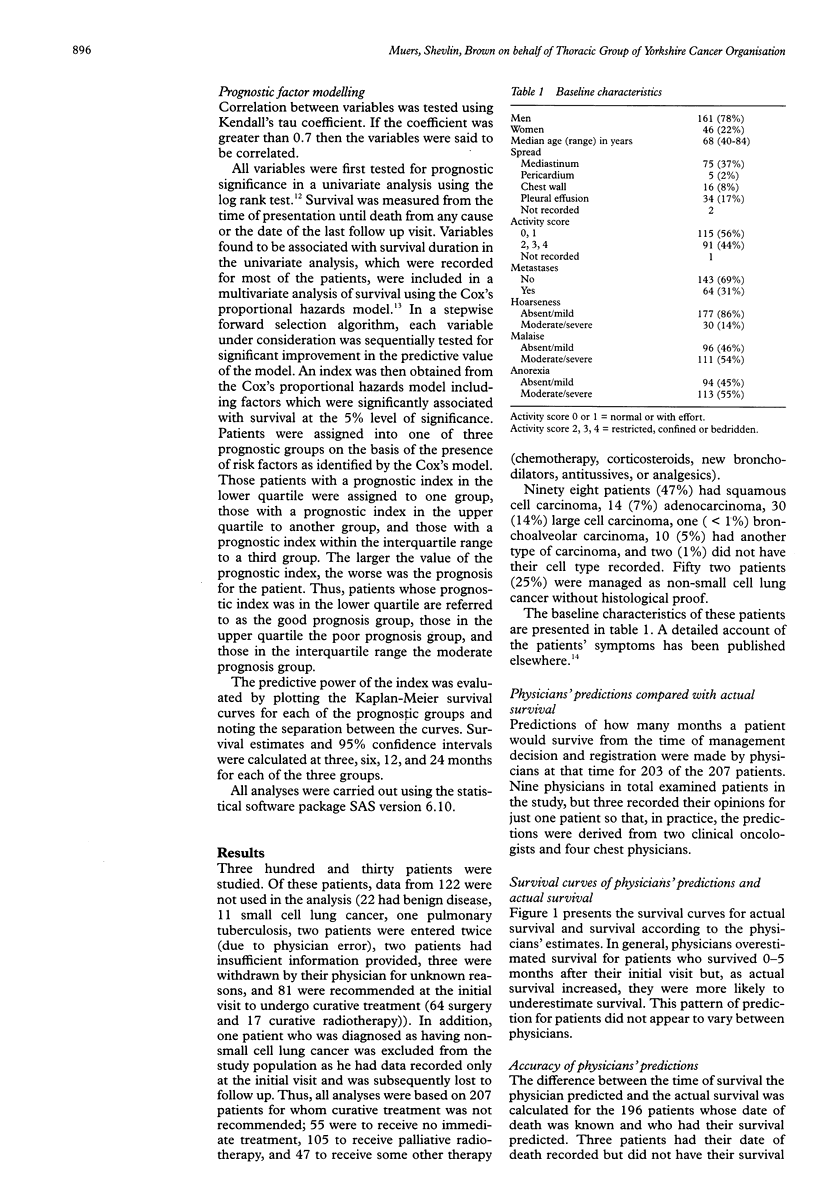
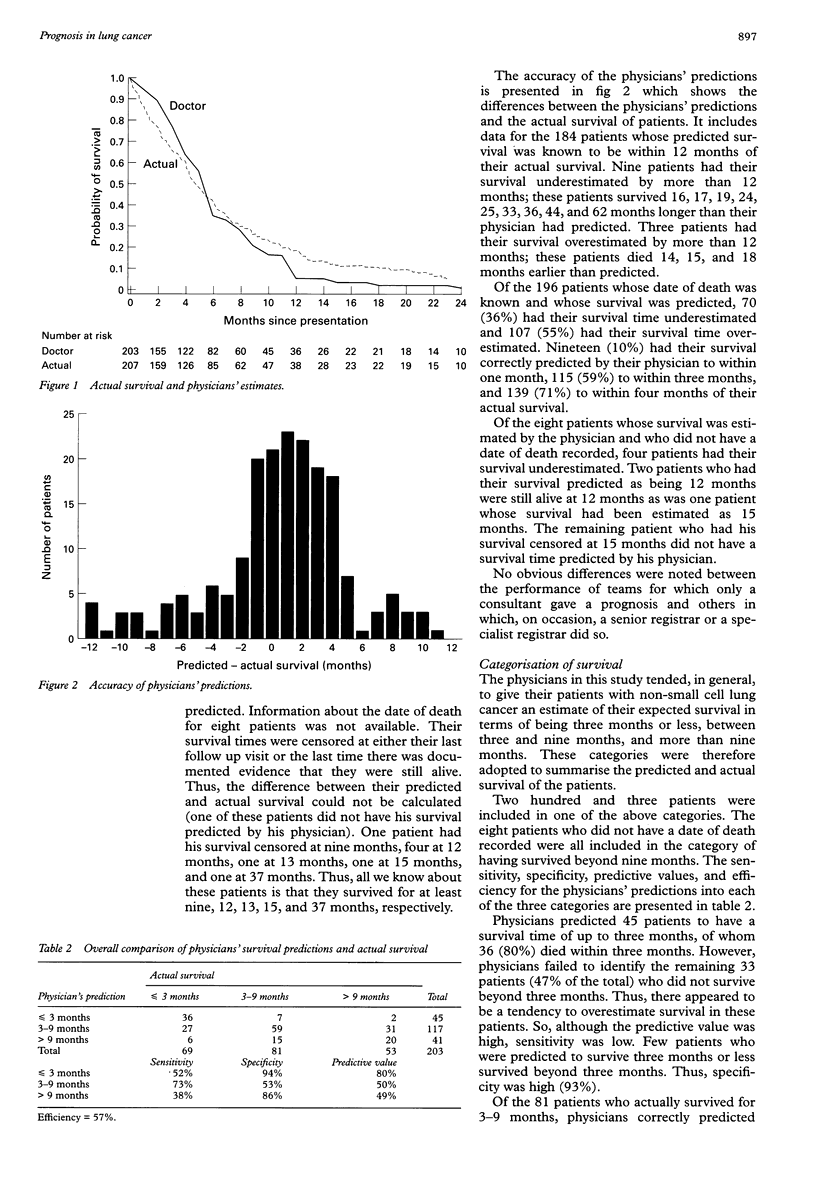
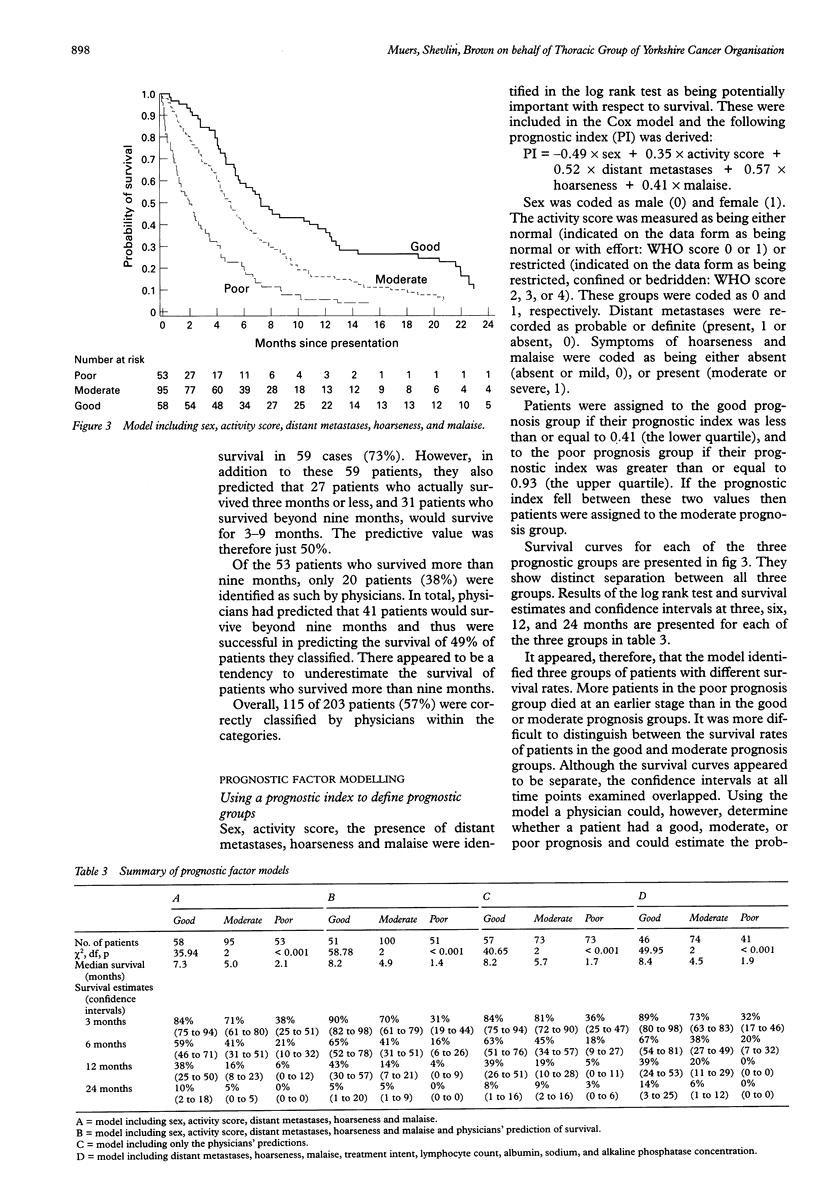
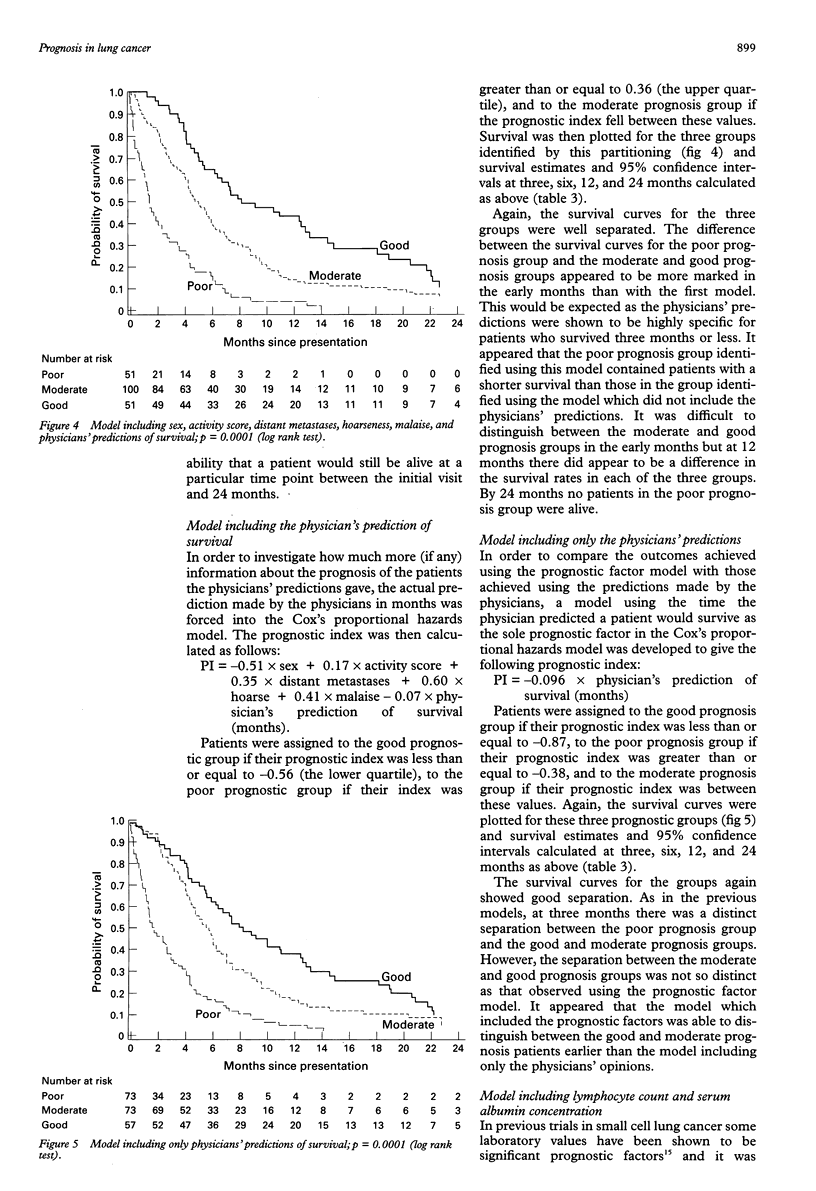
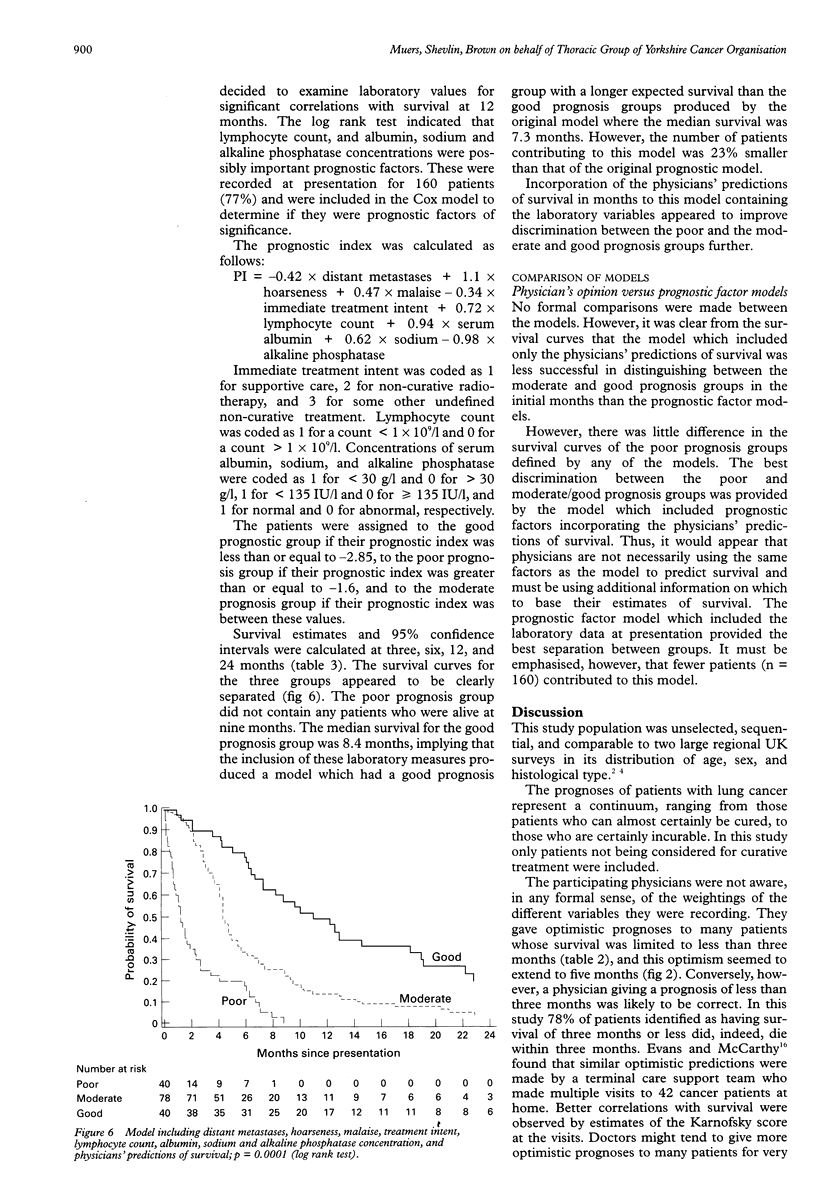
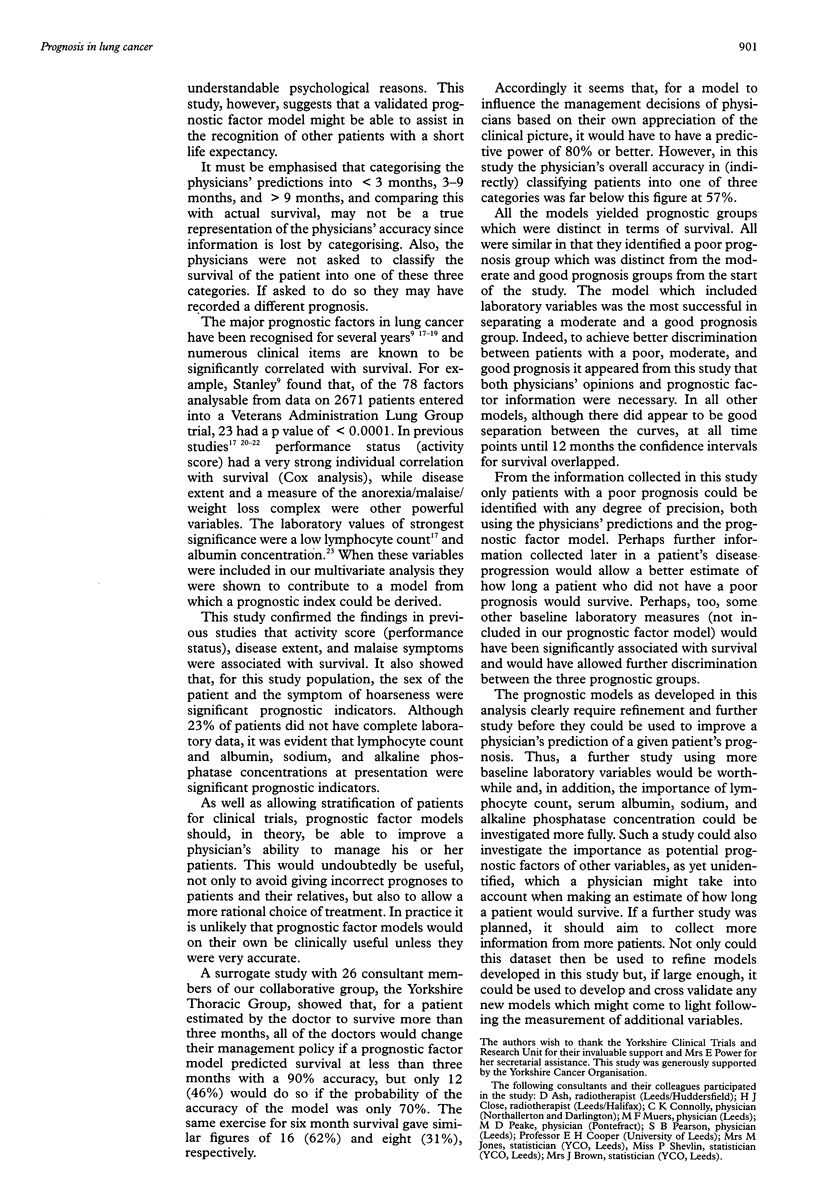
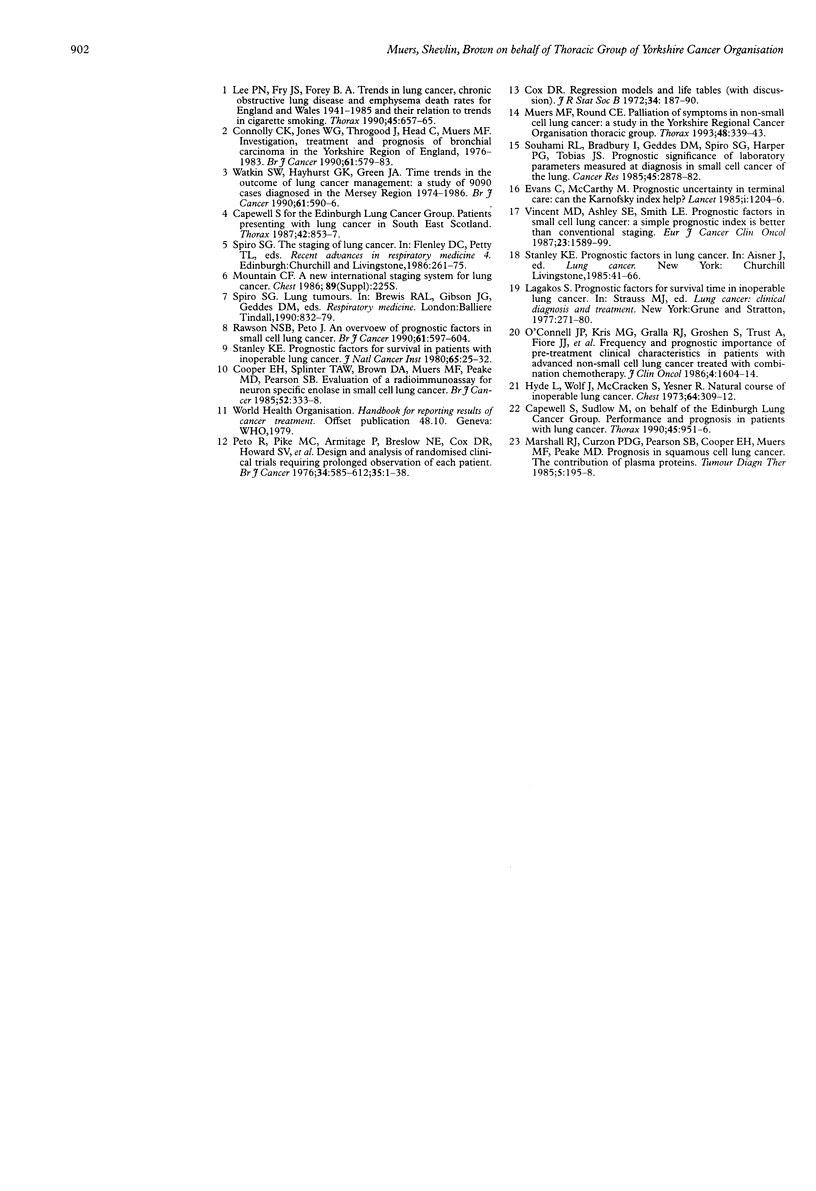
Selected References
These references are in PubMed. This may not be the complete list of references from this article.
- Capewell S., Sudlow M. F. Performance and prognosis in patients with lung cancer. The Edinburgh Lung Cancer Group. Thorax. 1990 Dec;45(12):951–956. doi: 10.1136/thx.45.12.951. [DOI] [PMC free article] [PubMed] [Google Scholar]
- Connolly C. K., Jones W. G., Thorogood J., Head C., Muers M. F. Investigation, treatment and prognosis of bronchial carcinoma in the Yorkshire Region of England 1976-1983. Br J Cancer. 1990 Apr;61(4):579–583. doi: 10.1038/bjc.1990.130. [DOI] [PMC free article] [PubMed] [Google Scholar]
- Cooper E. H., Splinter T. A., Brown D. A., Muers M. F., Peake M. D., Pearson S. L. Evaluation of a radioimmunoassay for neuron specific enolase in small cell lung cancer. Br J Cancer. 1985 Sep;52(3):333–338. doi: 10.1038/bjc.1985.198. [DOI] [PMC free article] [PubMed] [Google Scholar]
- Evans C., McCarthy M. Prognostic uncertainty in terminal care: can the Karnofsky index help? Lancet. 1985 May 25;1(8439):1204–1206. doi: 10.1016/s0140-6736(85)92876-4. [DOI] [PubMed] [Google Scholar]
- Hyde L., Wolf J., McCracken S., Yesner R. Natural course of inoperable lung cancer. Chest. 1973 Sep;64(3):309–312. doi: 10.1378/chest.64.3.309. [DOI] [PubMed] [Google Scholar]
- Lee P. N., Fry J. S., Forey B. A. Trends in lung cancer, chronic obstructive lung disease, and emphysema death rates for England and Wales 1941-85 and their relation to trends in cigarette smoking. Thorax. 1990 Sep;45(9):657–665. doi: 10.1136/thx.45.9.657. [DOI] [PMC free article] [PubMed] [Google Scholar]
- Mountain C. F. A new international staging system for lung cancer. Chest. 1986 Apr;89(4 Suppl):225S–233S. doi: 10.1378/chest.89.4_supplement.225s. [DOI] [PubMed] [Google Scholar]
- Muers M. F., Round C. E. Palliation of symptoms in non-small cell lung cancer: a study by the Yorkshire Regional Cancer Organisation Thoracic Group. Thorax. 1993 Apr;48(4):339–343. doi: 10.1136/thx.48.4.339. [DOI] [PMC free article] [PubMed] [Google Scholar]
- O'Connell J. P., Kris M. G., Gralla R. J., Groshen S., Trust A., Fiore J. J., Kelsen D. P., Heelan R. T., Golbey R. B. Frequency and prognostic importance of pretreatment clinical characteristics in patients with advanced non-small-cell lung cancer treated with combination chemotherapy. J Clin Oncol. 1986 Nov;4(11):1604–1614. doi: 10.1200/JCO.1986.4.11.1604. [DOI] [PubMed] [Google Scholar]
- Peto R., Pike M. C., Armitage P., Breslow N. E., Cox D. R., Howard S. V., Mantel N., McPherson K., Peto J., Smith P. G. Design and analysis of randomized clinical trials requiring prolonged observation of each patient. I. Introduction and design. Br J Cancer. 1976 Dec;34(6):585–612. doi: 10.1038/bjc.1976.220. [DOI] [PMC free article] [PubMed] [Google Scholar]
- Rawson N. S., Peto J. An overview of prognostic factors in small cell lung cancer. A report from the Subcommittee for the Management of Lung Cancer of the United Kingdom Coordinating Committee on Cancer Research. Br J Cancer. 1990 Apr;61(4):597–604. doi: 10.1038/bjc.1990.133. [DOI] [PMC free article] [PubMed] [Google Scholar]
- Souhami R. L., Bradbury I., Geddes D. M., Spiro S. G., Harper P. G., Tobias J. S. Prognostic significance of laboratory parameters measured at diagnosis in small cell carcinoma of the lung. Cancer Res. 1985 Jun;45(6):2878–2882. [PubMed] [Google Scholar]
- Stanley K. E. Prognostic factors for survival in patients with inoperable lung cancer. J Natl Cancer Inst. 1980 Jul;65(1):25–32. [PubMed] [Google Scholar]
- Vincent M. D., Ashley S. E., Smith I. E. Prognostic factors in small cell lung cancer: a simple prognostic index is better than conventional staging. Eur J Cancer Clin Oncol. 1987 Nov;23(11):1589–1599. doi: 10.1016/0277-5379(87)90436-6. [DOI] [PubMed] [Google Scholar]
- Watkin S. W., Hayhurst G. K., Green J. A. Time trends in the outcome of lung cancer management: a study of 9,090 cases diagnosed in the Mersey Region, 1974-86. Br J Cancer. 1990 Apr;61(4):590–596. doi: 10.1038/bjc.1990.132. [DOI] [PMC free article] [PubMed] [Google Scholar]


